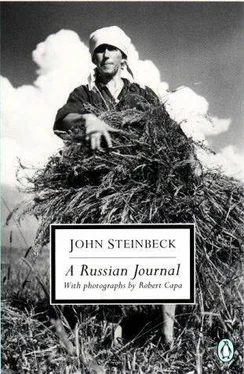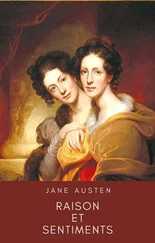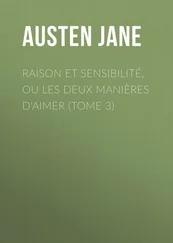John Steinbeck - A Russian Journal
Здесь есть возможность читать онлайн «John Steinbeck - A Russian Journal» весь текст электронной книги совершенно бесплатно (целиком полную версию без сокращений). В некоторых случаях можно слушать аудио, скачать через торрент в формате fb2 и присутствует краткое содержание. Жанр: Классическая проза, на английском языке. Описание произведения, (предисловие) а так же отзывы посетителей доступны на портале библиотеки ЛибКат.
- Название:A Russian Journal
- Автор:
- Жанр:
- Год:неизвестен
- ISBN:нет данных
- Рейтинг книги:4 / 5. Голосов: 1
-
Избранное:Добавить в избранное
- Отзывы:
-
Ваша оценка:
- 80
- 1
- 2
- 3
- 4
- 5
A Russian Journal: краткое содержание, описание и аннотация
Предлагаем к чтению аннотацию, описание, краткое содержание или предисловие (зависит от того, что написал сам автор книги «A Russian Journal»). Если вы не нашли необходимую информацию о книге — напишите в комментариях, мы постараемся отыскать её.
A Russian Journal — читать онлайн бесплатно полную книгу (весь текст) целиком
Ниже представлен текст книги, разбитый по страницам. Система сохранения места последней прочитанной страницы, позволяет с удобством читать онлайн бесплатно книгу «A Russian Journal», без необходимости каждый раз заново искать на чём Вы остановились. Поставьте закладку, и сможете в любой момент перейти на страницу, на которой закончили чтение.
Интервал:
Закладка:
Everyone in the street wore some medal, or ribbon, or decoration reminiscent of the war. The city boiled with activity.
I went over to the Herald Tribune office and found a note from Sweet Joe Newman. He was held up in Stockholm, and he asked me to cover the party for the Herald Tribune, since he couldn't get back to do it.
Capa was working feverishly over his films, criticizing his work himself, the quality of the developing, everything. He had an enormous number of negatives by now, and he spent hours in front of the window, looking through the negatives, and bitching badly. Nothing was correct, nothing was right.
We called Mr. Karaganov at the Voks office and asked him to find out exactly what we had to do to get the films out of Russia. We thought there might be some censorship, and we wanted to know what it was enough in advance so that we could make preparations for it. He assured us that he would go to work on it immediately and would let us know.
On the night before the celebration we were invited to the Bol-shoi Theater, but we weren't told what it would be. By some fortunate accident we were unable to go. We heard later that it was six hours of speeches, and no one could leave, for there were members of the government in the government box. It was one of the happiest accidents that ever happened to us.
The restaurants and cabarets were packed with people, and many of them were set aside for the delegates who had come from the other republics of the Soviet Union and from other countries, so that we couldn't get in at all. As a matter of fact it was very difficult to get dinner that night. The city was simply mobbed with people, and they walked slowly about the streets, stopping in one square to listen for a while to the music, and then trudging on to another square. They looked, and trudged, and looked. The country people were wide-eyed. Some of them had never seen the city before, and no one had ever seen the city so lighted up. There was some dancing in the squares, but not a great deal. Mostly the people trudged and stared, and trudged on and stared at something else. The museums were so packed that you couldn't get in at all. The theaters were mobbed. There was no building on which there was not at least one huge picture of Stalin, and the picture second in size was that of Molotov. Then there were huge portraits of the presidents of the different republics, and of the other heroes of the Soviet Union, their size graduated down.
Late in the evening we went to a little party at the house of an American Moscow correspondent who has been in Russia for many years. He speaks and reads Russian easily, and he told us a great many stories about some of the difficulties of running a house in present-day Russia. And just as with hotel serving, most of the difficulties came from the inefficiency of a bureaucratic system-so many records and so much bookkeeping made it almost impossible to get any repairs done.
After dinner he took a book from his shelves. "I want you to listen to this," he said, and began reading slowly, translating from Russian. And he read something like this-this is not an exact transcription, but it is close enough.
"The Russians of Moscow are highly suspicious of foreigners, who are watched constantly by the secret police. Every move is noticed and sent into central headquarters. A guard is placed on all foreigners. Furthermore, Russians do not receive foreigners in their houses, and they seem to be afraid even to talk to them very much. A message sent to a member of the government usually remains unanswered, and a further message is also unanswered. If one is importunate, one is told that this official has left the city or is sick. Foreigners are permitted to travel in Russia only after great difficulty, and during their travels they are very closely watched. Because of this general coldness and suspicion, foreigners visiting in Moscow are forced to associate with each other exclusively."
There was a good deal more in this vein, and at the end our friend looked up and said, "What do you think of it?"
And we said, "We don't think you can get it past the censor."
He laughed. "But this was written in 1634. It is from a book called Voyages in Muscovy, Tartary and Persia, by a man named Adam Olearius." And he said, "Would you like to hear an account of the Moscow conference?"
And he read from another book something like this: "Diplomatically the Russians are very difficult to get along with. If one submits a plan, they counter it with another plan. Their diplomats are not trained in the large world, but are mostly people who have never left Russia. Indeed, a Russian who has lived in France is considered a Frenchman; one who has lived in Germany is considered a German, and these are not trusted at home.
"The Russians cannot go diplomatically in a straight line. They never get to the point, they argue in circles. Words are picked up, and bandied, and tossed, until in the end a general confusion is the result of any conference."
After a pause he said, "And that was written in 1661 by a French diplomat, Augustin, Baron de Mayerburg. These things make one much less restless under the present setup. I don't think Russia has changed very much in some respects. Ambassadors and diplomats from foreign countries have been going crazy here for six hundred years."
Quite late in the night our host tried to drive us home, but halfway there his car ran out of gasoline. He got out and stopped the first motorist who came by. There was a quick exchange of Russian. He gave the man a hundred roubles, and we got in and were driven home by this stranger. And we found that this can nearly always be done. Almost any car becomes a taxi late at night, for a very high price. This is very fortunate, for there are practically no regular taxis on run. The taxis usually cover a route and take the car full. You must say where you are going, and the taxi driver will tell you whether he is going in that direction. They operate a little like streetcars.
In addition to all the decoration a great deal of new equipment was coming out in celebration of the anniversary. Big new electric streetcars, trackless streetcars, were put on the streets for this celebration. The Ziss automobile plant released many beautiful new cars, which were almost exclusively put to the use of the big delegations from foreign countries.
Although it was only September 6, it was becoming very cold in Moscow. Our room was freezing, and the heat would not be turned on for a month. We wore our overcoats when we were not in bed. The other correspondents in the Metropole Hotel were unpacking their electric heaters which had been put away for the summer.
Almost at dawn on the day of the celebration Capa was out raging through the streets with his cameras. He had a Russian cameraman with him now to facilitate his movements about the city and to explain to policemen that he was all right. And in Red Square he had a militia man assigned to him to make things easy and to stop any unpleasantness. He photographed buildings, and displays, and crowds, and faces, and groups of trudging people, and he was as happy as it is possible for him to be when he is working.
In many streets little sidewalk restaurants were set up-one directly across from our hotel-two little tables, with white cloths on them, and vases of flowers, and a big samovar, and a glassed-in display counter for little sandwiches (open-face sandwiches with sausage and cheese), jars of pickles, and small pears and apples, all for sale.
It was a brilliant cold day. The elephants from the circus paraded through the streets, preceded by clowns. There was not to be any military parade on this day, but there was a big show scheduled for the stadium, and to that we went in the afternoon.
It was a show of mass formations of factory workers in brilliant costumes. They did group calisthenics and marches. They made figures on the field. There were races, some for women and some for men, competitions in shot-putting and in volley ball. There was a showing of dancing horses, beautifully trained horses, which waltzed, and polkaed, and bowed, and pirouetted.
Читать дальшеИнтервал:
Закладка:
Похожие книги на «A Russian Journal»
Представляем Вашему вниманию похожие книги на «A Russian Journal» списком для выбора. Мы отобрали схожую по названию и смыслу литературу в надежде предоставить читателям больше вариантов отыскать новые, интересные, ещё непрочитанные произведения.
Обсуждение, отзывы о книге «A Russian Journal» и просто собственные мнения читателей. Оставьте ваши комментарии, напишите, что Вы думаете о произведении, его смысле или главных героях. Укажите что конкретно понравилось, а что нет, и почему Вы так считаете.











